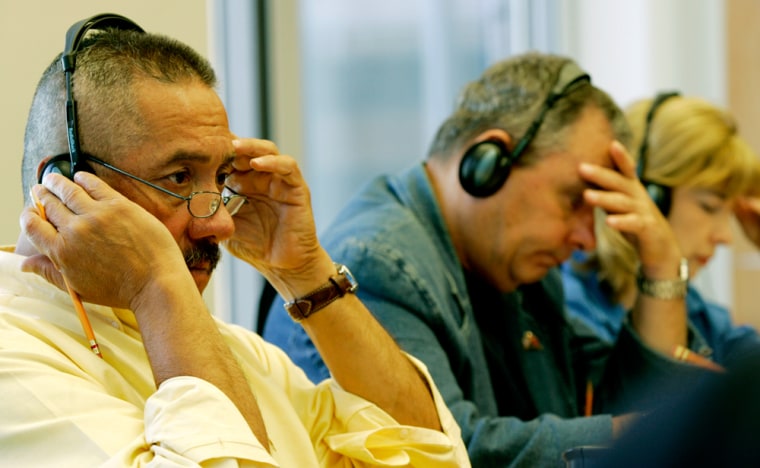A fire official described near chaos inside the World Trade Center, with communication becoming increasingly difficult as firefighters tried to reach people trapped by a devastating blaze raging high overhead, recordings released Wednesday of emergency phone calls from the Sept. 11 attacks show.
“We’re in a state of confusion,” said Chief Dennis Devlin of Battalion 9. “We have no cell phone service anywhere because of the disaster ... Bring all the additional handy talkies.”
Devlin tried to get a rundown of all the companies dispatched to the burning 110-story buildings. He was still inside the south Trade Center tower when it collapsed.
The same mix of concern and confusion was evident in recordings of more of the 1,613 previously undisclosed emergency calls made amid the horror in the towers after the hijacked planes hit the trade center. The calls “reveal extraordinary professionalism and bravery,” the department said. It lost 343 firefighters that day.
“One of the towers just collapsed,” said a fire lieutenant on another call. “Everybody’s got to be inside of it. ... There’s got to be thousands of the people inside it. One of the towers just came down on everybody.”
‘You’re in a bad situation, ma’am’
Frantic callers trapped on the upper floors of the burning World Trade Center sought help from emergency operators, who were unable to offer much more than words of encouragement.
“There’s heavy smoke and flames and the building management is announcing that everything is all right, and it’s not and they’re confused,” said one fire dispatcher after fielding a phone call from someone trapped on the 82nd floor.
Another operator, speaking to someone stranded on the 103rd floor, promised, “I’m going to do my best.”
“I want you to go on the floor. Kneel on the floor. On the floor,” said another operator. Another, speaking to a woman stuck on the 83rd floor, offered hope of a rescue team that never appeared.
“Listen to me, ma’am,” that operator told a panicky Melissa Doi during a 20-minute phone call. “You’re not dying. You’re in a bad situation, ma’am.”
‘Oh, my lord’
A portion of Doi’s end of the conversation was played for jurors in April at the trial of Sept. 11 conspirator Zacarias Moussaoui.
“I’m going to die, aren’t I?” Doi asked the dispatcher.
“Ma’am, just stay calm for me, OK?” the dispatcher said. The conversation ended with the operator trying vainly to speak with Doi, a financial manager for IQ Financial Systems: “Not dead, not dead,” the operator said to no response. “They sound like deep sleep.”
The phone line cut out. Doi never made it out of the World Trade Center.
“Oh, my lord,” said the operator, whose words to Doi were previously not made public.
‘We’re still heading up’
The newly released calls included the voices of 19 firefighters and two emergency medical technicians killed in the collapses, although most of the calls are from firefighters asking dispatchers where they should report for duty, the Fire Department said.
One tape contained fire Capt. Patrick Brown calling from the 35th floor, reporting a chaotic scene of civilians — some with burn injuries — heading down the stairwell as the firefighters headed up.
“Apparently it’s above the 75th floor,” the firefighter said. “I don’t know if they got there yet. We’re still heading up.”
About a dozen family members of 9/11 victims arrived in a midtown Manhattan conference room Wednesday to hear the tapes, which again raised questions about the lack of communication on the scene.
“We’re still looking for information for how we can fix what went wrong that day,” said Aggie McCaffrey, whose brother Orio Palmer was among the 343 firefighters killed.
The calls included 10 previously unreleased 911 calls from people trapped in the towers, although those calls include only the voices of the operators who heard their pleas.
Too emotional, intense
The New York Times and family members had sued for access to the emergency calls and firefighters’ oral histories. Attorneys said they wanted to find out what happened inside the towers after two hijacked jetliners crashed into them and what dispatchers told workers and rescuers.
Families of the rescuers identified on the tapes were notified, the Fire Department said. Because they were public employees, their entire calls were released.
Some reflected the confusion for dispatchers trying to handle calls from workers who complained they weren’t getting enough instructions.
“We are being bombarded by calls,” responded one dispatcher.
An off-duty worker was in tears when she called, saying she couldn’t get to work: “Everything is blocked.”
“Why are you crying, Carol?” said her supervisor.
“The World Trade Center collapsed.”
“Everything is collapsed, baby.”
“All those people — what about the EMTs and paramedics and firefighters in there helping people get out?”
“I don’t know, sweetie, I really don’t know.”
“Oh God.”
The city in March released transcripts of 130 calls from people, including only the voices of operators and other public employees. The callers’ voices were cut out after city attorneys argued that their pleas for help were too emotional and intense to be publicized without their families’ consent.
‘Regrets the delay’
Thousands of pages of emergency workers’ oral histories and radio transmissions were released last August.
The fire department said Tuesday that when it first turned over its emergency calls, officials “misinterpreted instructions they were given on what kinds of calls to copy” and “failed to capture” other 911 calls they knew had to be made public.
“The department regrets the delay,” it said in a statement.
Fire Commissioner Nicholas Scoppetta ordered his department to search for additional recordings when another tape turned up shortly after the March release of 911 calls. City officials listened to all calls to emergency and fire dispatchers between 8:45 a.m. and 10:45 a.m. on Sept. 11 to locate all available recordings.
